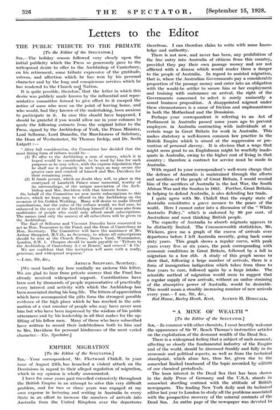EMPIRE MIGRATION
[To the Editor of the SPECTATOR.]
S1R,—Your correspondent, Mr. Fleetwood Chidell, in your issue of August 25th, has launched a violent attack on the Dominions in regard to their alleged regulation of migration, which in my opinion is wholly unwarranted.
I have for some years past travelled extensively throughout the British Empire in an attempt to solve this very difficult problem, and for two or three years was engaged at my own expense in lecturing and writing in Australia in every State in an effort to increase the numbers of arrivals into Australia from the United Kingdom over the departures therefrom. I can therefore claim to write with some know. ledge and authority.
There is not now, and never has been, any prohibition of the free entry into Australia of citizens from this country, provided they pay their own passage money and are not afflicted with a disease which would render them a danger to the people of Australia. In regard to assisted migration, that is, where the. Australian Governments pay a considerable proportion of the passage money and enter into an obligation with the would-be settler to secure him or her employment and training with sustenance on arrival, the right of the Governments concerned to select is surely eminently a sound business proposition. A disappointed migrant under these circumstances is a cause of friction and unpleasantness in both the Motherland and the Dominion.
Perhaps your correspondent is referring to an Act of Parliament in Australia passed some years ago to prevent employers in Australia contracting with individuals at a certain wage in Great Britain for work in Australia. This makes statutory a well-known common law practice in the British Empire which is aimed at the suppression or pre- vention of personal slavery. It is obvious that a wage that might seem good to an Englishman might be woefully inade- quate in Australia, owing to the higher cost of living in that country ; therefore a contract for service must be made in Australia.
With regard to your correspondent's well-worn charge that the defence of Australia is maintained through the efforts and sacrifices of the people of Great Britain, I would remind him of the sacrifices of Australia in the last War, the South African War and the Soudan in 1885. Further, Great Britain, in helping to defend Australia, is also defending her trade.
I quite agree with Mr. Chidell that the empty state of Australia constitutes a grave menace to the peace of the world. Here I cannot enter into a discussion of the " White Australia Policy," which is endorsed by 90 per cent. of Australians and most thinking British people.
The capacity of Australia to absorb migrants appears ft) be distinctly limited. The Commonwealth statistician, Mr. Wickens, gave me a graph of the excess of arrivals over departures before I left Australia recently, going back some sixty years. This graph shows a regular curve, with peak years every five or six years, the peak corresponding with economic conditions in Great Britain, followed by a fall in migration to a low ebb. A study of this graph seems to show that, following a large number of arrivals, there is a form of immigration indigestion which takes from three to four years to cure, followed again by a large intake. The scientific method of migration would seem to suggest that a regular supply of new arrivals, without an undue straining of the absorptive power of Australia, would be desirable. This would mean a steadily increasing number of new arrivals every year.—I am, Sir, &c.,
Red House, Bexley Heath, Kent. ALFRED H. HORSFALL.






































 Previous page
Previous page